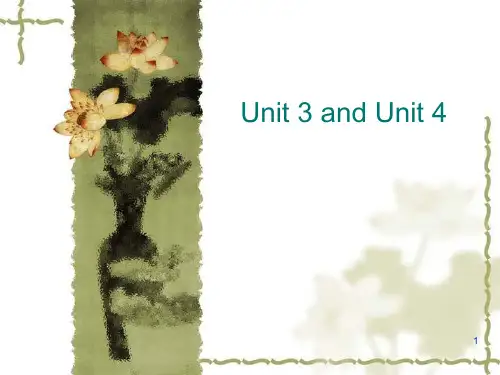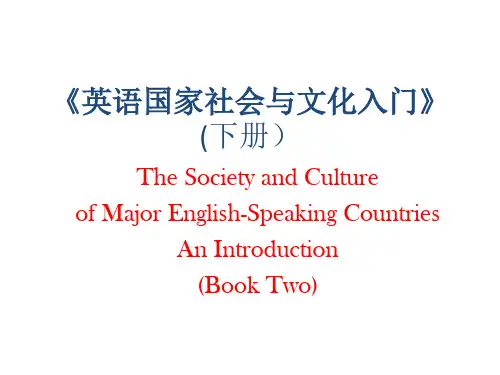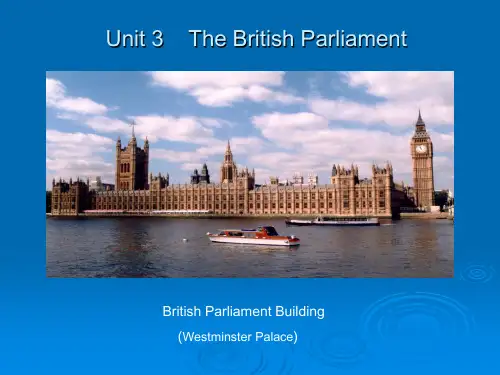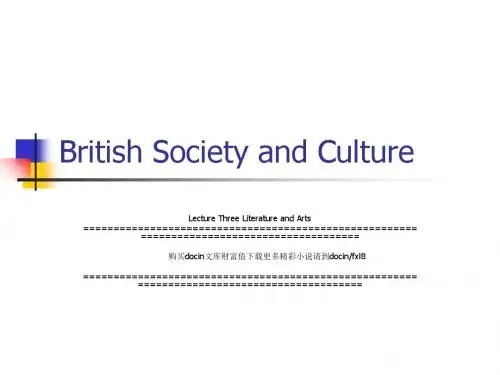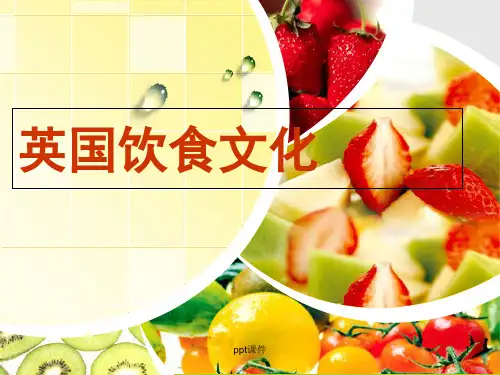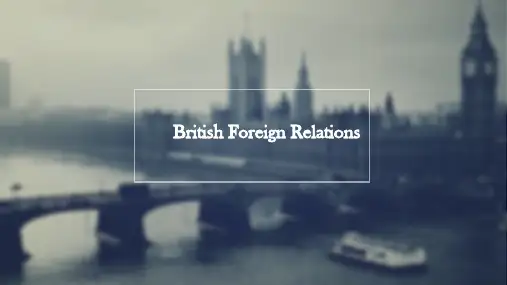清华英国社会与文化课件第三周British Food_967101355
- 格式:ppt
- 大小:16.29 MB
- 文档页数:160
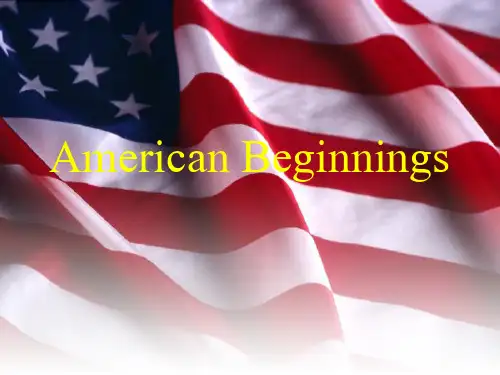
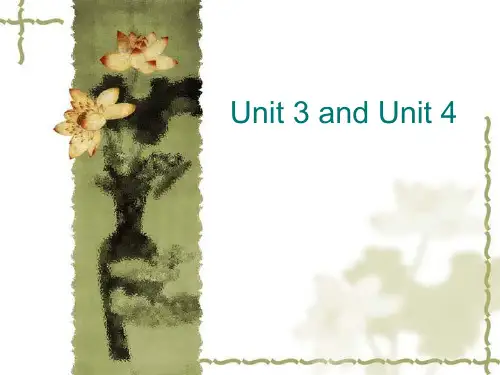

外国语学院教案英国社会与文化Lecture 1 Food & DrinksBreakfast•traditional English breakfast: sausages, eggs (scrambled or fried or poached ), bacon, black pudding, mushrooms, fried tomatoes, baked beans, accompanied by toast and tea or coffee.typical English breakfast now:•toast with butter or margarine and jam (often strawberry, raspberry, apricot jam), or marmalade, orange juice or a cup of coffee•a bowl of cereal, for example, cornflakes with milk, or porridge (a mixture of oats, hot milk and sugar)Continental breakfast: croissant, cheese or ham, coffeeLunch/Luncheon/Dinner•Packed lunch: sandwich, a packet of crisps, a piece of fruit and a drink.A Ploughman’s Lunch•a traditional lunch for farmers, also traditional if you go to eat in a pub at midday.Sunday Roast•a traditional British main meal served on Sundays (usually in the early afternoon for lunch) Dinner•meat and two veg followed by dessertTea break•Mid-morning Snacks (10 o'clocks/ Elevenses)•Afternoon teaa cup of tea or coffee, cola or Pepsi etc.with biscuits, crisps, chocolate bars etc.Afternoon tea•Duchess of BedfordAfternoon tea was "invented" by Anna, Duchess of Bedford (1783 – 1857) in 1840 as "a way to quell the inevitable hunger pangs between lunch and dinner".High tea & afternoon tea•High tea is a light meal served around 6-7 P.M., when the worker comes home from work. It isalways a hot meal, like sausage and chips, followed by bread, butter and jam, cakes, and hot tea to drink.•Afternoon tea is served at around 4, and is an elegant upper-class meal, with snacks and tea or coffee to drink.Fast food / takeaways•fish 'n' chips•Pizza•Chinese food•Curry•Pies•SpaghettiEnglish Traditional food•Cheddar Cheese•Pudding•Roast beef and Yorkshire Pudding•Fish and chips•Jellied eels•Scottish shortbreadTable mannersTable-setting basics–Fork on the left–Knife and spoon on the right–Knife next to plate with blade toward plate–Utensils should be placed in the order of use, with those for the first course farthest from the plate and those for the last course closest to the plate.–Liquids on your right–Solids on your leftHow to eat correctly•Eat with cutlery (knife, fork, spoon)•Start with the cutlery on the outside and work your way inward with each subsequent course •The fork is held, with the prongs facing down, in the left hand, and the knife in the right.Alcoholic Drinks•Stout is dark brown and tastes a little bitter. The most popular is the Irish drink called Guinness. When you order a beer,you may have a choice between a pint ( half a liter) or a half pint. •Lager is a lighter-coloured type of beer and is normally served cold.•Bitter is a traditional British beer (known as ale), it ’s quite strong and leaves a bitter taste in your mouth after drinking. Served at room temperature.•Cider is a traditional English drink made from apples. It may be sweet or dry.•Whisky is a strong drink produced in Scotland and in Ireland.•Shandy is a mixture of beer and lemonade.•Drinks are often mixed as : Gin and tonic, Whisky and coke, V odka and tonic.•You have to be 18 years old to order a drinkLecture 2 Travelling Around the UKTravel Conditions⏹Cars are the most popular forms of transport but the public transportation systems of bus, coach, rail, or air offer a wide choice of routes and networks to any destination.⏹For coach and rail travel a ticket may be purchased immediately before a journey or in advance.⏹Buses: When seeing your bus approaching, wave your hand to let the driver know to stop. Watch for your stop and ring the bell when you want to get off. If you don't know your stop, tell the driver when you get on the bus and they will announce it for you. Always say thank you.⏹One way of seeing local major sights is on an open-top double-decker bus. Tickets are valid for24 hours and allow unlimited “hop on / hop off” travel.⏹TaxiA black cab:a licensed taxi; 10% tip.You can telephone for a black cab, hail one in the street or find one in a rankA minicab: private; book in advance⏹Bicycles: a great way to get around at no cost, with the added benefit of helping you to keep fit.⏹Better wear a bicycle helmet for your own safety and well being. Wearing reflective clothing and using lights if cycling at night is also recommended.Making your money go further⏹many discount cards and schemes available that can help students to save money, especially if you are planning to travel frequently.⏹Cheaper fares are often available if the ticket is bought in advance or for a particular day of the week.⏹Single or return tickets may be purchased. Return tickets are cheaper. (cheap day return or open return)⏹Travel cards are available for students, giving them cheaper concessionary fares.✓International Student Identity Card (ISIC)✓Young Person’s Coachcard✓Young Person's Railcard⏹One-day off-peak Travel card (after 9:30 am) for travel on underground trains and most buses in London⏹Daysaversideal for leisure journeys and gives unlimited travel on Metro, Ferry and local rail services forthe whole day.⏹Oyster cardsIf in London for more than seven consecutive days, consider buying a pre-paid travel card.Where to stay⏹Bed and Breakfastthe charge includes a bed for the night and an English breakfast: “traditional” style of bacon and eggs followed by toast, or “continental” style, coffee and croissants.⏹Youth Hostelspopular with young people. Cheap and basic self-catering accommodation is provided, usually in dormitories, with a warden. But visitors have to tidy up after themselves.⏹Camp sitesTravel Destinations and AttractionsThe most popular destinations :⏹Seaside attractions⏹Areas of natural beauty: mountains; Lough Ness and the Lake District⏹Historical or cultural sites: Stonehenge;Edinburgh castle; Stratford upon Avon;Windsor Castle; Bath; the university cityof CambridgeLecture 3 The British Ways & MannersPolitenessMagic words●Thank you / cheers / ta●Please●Sorry●I don’t really like asking you, but… / I know the trouble I’m cau sing you, but would you mind…?●Have a nice dayTerms of Endearment●South England: love, lovey, dear, darling, sweetie, pet, petal●North England: duck, flower, chuck●Scotland: henPolite in the way they behave●Smile a lot●Queuing for everything●Lady first : showing respect to females●Hold the door for the person after you●Drivers would always stop to let the people across the road first.●Polite way of using mobile phone●Complaining politelyDo’s and Don’ts●Do Smile●Do not spit/pick your nose/pass wind in public●Do not ask personal or intimate questions (marital status, salary, age, religion, etc)●Avoid physical contact with strangers beyond a handshake on first meeting.Social customspunctualityInvitations●give a gift to your host, such as flowers, chocolates, or wine●Send a short thank-you note after the visit or telephone the following day.Meeting and Greeting●keep your distance●offer them your hand●kissing and hugging are only for friends.Lecture 4 ShoppingThe High StreetSupermarkets⏹The leading supermarket chainsTesco Morrison Sainsbury’s AsdaWays to save money in the supermarket⏹Apply for the loyalty card. (student discount)⏹Supermarkets may sell fresh food cheaply if it is close to its “use by” date.⏹Goods sold using the supermarket's own label may be cheaper and the quality is often similar.⏹Supermarkets often have special offers such as "two for the price of one".Markets⏹I’ll have a pound of carrots.⏹Three pounds of apples for 50 p (3 lb for 50 p)Department Stores⏹Marks & Spencer⏹Fenwick⏹John Lewis⏹Harrods (the largest one)⏹selfridgesSpecialized stores⏹WHSmith (newsagents, stationers, CDs and DVDs)⏹Pharmacy, Superdrug, Boots⏹The body shop⏹Barber’s shop⏹DixonsRefundCan I have a refund?/ I’d like to get a refund on this. / I’m afraid I have to return this.Working Hours⏹9:00 am – 5:30 pm from Monday to Saturday⏹9:00 am – 8:00 pm on Thursday (shopping day)⏹11:00 am to 5:00 pm on SundayHow much do things cost in England?Bargain⏹Don’t try to bargain in the UK. The British do not expect or welcome bargaining.The biggest sales are usually after Christmas (late December / early January). Summer sales are in July or August.Money used in the UK⏹8 denominations of coin1p and 2p (copper)5p, 10p, 20p and 50p (silver)£ 1 (gold)£ 2 (gold and silver)V AT Refunds⏹If you buy some expensive goods less than 3 months before you leave the UK, you may be able to reclaim VAT (value added tax).⏹The current rate of V AT in the UK is 20% .Lecture 5 Holidays & FestivalsBonfire Night / Guy Fawkes’ Night (November 5th)▪In 1605 Guy Fawkes attempted to kill King James I and to blow up the Houses of Parliament. ▪Throughout England, towns and villages light huge bonfires, let off magnificent fireworks, burn an effigy of Guy Fawkes and celebrate the fact that the Parliament and James I were not blown sky high.Hogmanay (Scotland)▪New Year’s Eve in Scotland; the major winter celebration, and overshadows Christmas▪Torch parade▪Street parties▪Fireworks▪First footingBurns’ Night▪Every year Burns is commemorated by Scots all over the world▪Burns’ supperWhen the haggis is on the table, the host reads the "Address to a Haggis". At the end of the reading, the haggis is ceremonially sliced into two pieces and the meal begins.Haggis (P33)St. Patrick’s Day (March 17) Northern IrelandCloverPeople wear greenEisteddfod (1st week of August) Wales▪an annual assembly of Welsh poets and musicians, to celebrate their culture and to preserve their language (Cymru), to remind people throughout the UK of Wales’ special cultural heritage.Valentine’s DayTraditionally sending cards which do not let on who the sender is.publish messages of love and wishes for the loved ones on the classified pages on newspapers.Birds and Love ( woodpecker no man at all)Public holidays / Bank holidays (often fall on Monday)a day on which banks are legally closed and which is kept as a public holiday in the UK. It often falls on Monday.▪Christmas has a Christian meaning:it commemorates the birth of Jesus Christ▪Christmas crackersa brightly coloured paper tube, twisted at both ends. There is a banger inside the cracker and when it is pulled by two people, the cracker snaps in half with a bang. Inside the cracker there is a tissue paper hat, a joke and a little gift.Two Christmas traditions which are particularly British▪to hear the Queen give her Christmas message to her realm over the television and radio.▪Boxing Day, which falls on the day after Christmas, a day for shopping, eating, visiting and relaxingEaster▪The Easter weekend is the time for Christian traditions which commemorates the crucifixion and resurrection of Jesus Christ. It is observed on the first Sunday after a full moon on or after 21 March.▪Maunday Thursday (濯足日)Christians remember it as the day of the Last Supper, when Jesus met with his followers before he was betrayed by Judas and was captured by the Romans.▪Good Friday is the day when Christians remember the death of Jesus Christ, who was crucified by the Romans. Christian churches hold special services, and are often decorated with flowers.▪Easter SundaySpecial Easter Sunday services in Christian churches celebrate the belief that Jesus Christ came back to life (known as the "resurrection") on the third day after he was killed.Christians gather together on Easter Sunday for a Sunrise Service. This service takes place on a hill side so everyone can see the sun rise.▪People eat "hot cross buns": currant buns with a symbol on the top which represent the cross on which Jesus was killed (these are cut in two, toasted, and butter is spread on each half).▪Easter eggsFor Christians, Easter eggs symbolise new life. They believe that, through his resurrection, Jesus defeated death and sin and offers people the promise of eternal life if they follow his teachings.▪Easter Mondaya bank holiday and has little religious significance. It is the occasion for numerous secular customs.▪The Easter Bunnya symbol of spring and fertility. In the UK children believe that if they are good the "Easter Bunny " will leave (chocolate) eggs for themHalloween (31st Oct, the eve of All Saints’ Day)▪The tradition of Halloween began way back in the fifth century BC by the Irish Celts, who organised their year according to the agricultural calendar and marked the transition from one year to the next on October 31.▪Pumpkin and Jack-O’-Lantern (Halloween lanterns)▪Trick or treatIf children knock on your door and say 'trick or treat', you may want to give them some sweets (otherwise they may play a small trick on you!)Remembrance Day (11th NOV.)▪People wear red poppy to commemorate the soldiers who died in the First World War. The eleventh hour of the eleventh day of the eleventh month in 1918 marks the signing of the Armistice.Lecture 6 Family lifeModern British FamiliesThe increase in the number of divorce:It’s expected 42% of marriages will end in divorceModern British FamiliesThe increase in the number of working mothersThe increase in the number of single mothers, particularly among teenagersSingle mothers in BritainThis week, the Government-backed British Social Attitudes survey of lifestyles concluded that the proportion of single mothers has increased from 10 per cent to 25 in the past 20 years.More than half of these have never lived with a man because they make the 'lifestyle choice' to stay on their own.MarriageMarriage between the ages of 16 and 18 is possible with parental consent.CohabitingCivil partnershipThe Legislation to allow same-sex marriage in England and Wales was passed by the Parliament of the United Kingdom in July 2013 and came into force on 13 March 2014, and the first same-sex marriages took place on 29 March 2014.Types of HousesA detached house:A house which is not joined to another houseA semi-detached house: a house which is joined to another house on one side•terraced : a house which is joined to other houses on two sides/ a house which is part of a line of housesBungalow: a house with no stairs, on one level.Flat/ apartment: a house which is part of a bigger buildingCost of HousesAccording to recent reports in the media, the average UK house price has now reached £250,000.The Culture and Society of the UKBritish WeddingsGROOMBRIDETHE BEST MANBRIDESMAID●To tie the knotWedding ListsStag party & Hen party●Stag party: a party for a man who is going to get married, to which only his male friends are invited●Hen party: a party for a woman before she is married●Things the Bride must wear when she gets marriedSomething Old something New something Borrowed something BlueWedding ceremony●Religious ceremony takes place in a church.●Civil ceremony can be held in a registry office, in a hotel, or even on a boat!Arriving●Walking the aisleThe Wedding Vows●John Smith, do you take this woman, Mary White, to be your lawful wedded wife, to live together in the estate of matrimony Will you love her, honor her, comfort her and keep her in sickness and in health, and forsaking all others, be true to her as long as you both shall live.●I, John Smith, take you, Mary White, as my wedded wife, to have or hold from this day forward, for better or for worse, for richer or for poorer, in sickness and in health, to love and to cherish, till death do us part.Confetti●Italian words for sweets●Colored paper; rice; raisins or nuts:to bestow prosperity and fertility on the couple. Reception●The wedding cakeThe couple make the first cut together to symbolise their shared future●DancingThe Wedding Bouquet (Flowers)●The bride throws her bouquet to all the unmarried females present, the person who catches the bouquet is said to be the next bride.Leaving for the honeymoonLecture 7 WelfareWhat is a welfare state?It can be defined as “ a state with a government which assumes responsibility of the well-being of its citizens throughout life”.A welfare state is a system in which the government✓provides free social services such as education and health✓gives money to people when they are unable to work, because they are old, unemployed, or sick.Resources for welfareNational Insurance contributionsGeneral taxationV ATWho started the idea?William Beveridge (1879 - 1963)a British economist and social reformer, closely associated with the development of the welfare state.“Beveridge Report 1942”1) to establish the National Health Service with free medical treatment for all;2) to provide 'social security' so that the population would be protected from the “cradle to the grave”3 areas of welfare provisionSocial securityHealthHousingSocial securityFor children and gravidas (child benefit; single parent allowance)For the disabled and sick (sickness benefit; disability livign allowance)For the retired (basic retirement benefit)For the widows (widow’s pension; widowed mother’s allowance)For the unemployed (job seekers allowance)For the low income people (income support)Different AttitudesSome people criticize the welfare state for being too generous. Others claim that it is notgenerous enough.ProblemsFigures show the scale of the problem facing British welfare system, which has been criticised for allowing jobless people to be better off than those in work.Speech by Prime Minister David Cameron on welfare reform (2012)Building that society is simply not possible without radically reforming welfare. The government is promising to “make work pay” as it sets out plans to ensure people in work are better than the unemployed.The National Health Sevice (NHS)•the world’s largest publicly funded health service. Almost all services are free.It covers everything from antenatal screening and routine treatments for long-term conditions, to transplants, emergency treatment and end-of-life care.•With the world’s largest employees and a budget about £100 billion a year.Funding 80% from general taxationPrinciplesComprehensive and free medical treatment for all, based upon need, not the ability to payHow to obtain the serviceRegister on a general practitioner’s (GP’s) list;Make an appointment and contact your GP first;If necessary, GP may refer the patient to the specialist in hospital;If life-threatening, visit A&E directly or call 999.Who are entitled to the serviceSome visitors to the UK are entitled to at least some NHS hospital treatment free of charge. These include people working for UK-based employers and students on courses of at least six months’ duration.ComplaintsPoor standardsBureaucracyLong waiting listLong waiting time in A&E department。

